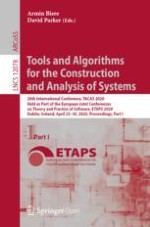Open Access 2020 | Open Access | Buch

Tools and Algorithms for the Construction and Analysis of Systems
26th International Conference, TACAS 2020, Held as Part of the European Joint Conferences on Theory and Practice of Software, ETAPS 2020, Dublin, Ireland, April 25–30, 2020, Proceedings, Part I
herausgegeben von: Prof. Armin Biere, Prof. David Parker
Verlag: Springer International Publishing
Buchreihe : Lecture Notes in Computer Science